Major Works and Translations
Works in Japanese (Tokyo is place of publication for all) | Works in English (including translations and anthologies)
Works in Japanese (Tokyo is place of publication for all)
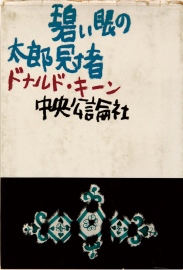
"Aoi Me No Tarōkaja (The Blue-Eyed Tarōkaja)"
Chūo Kōronsha, 1957
The first book Donald Keene wrote in Japanese. Tanizaki Jun’ichirō contributed the preface. The striking title was also used for a book of Keene’s later essays, The Blue-Eyed Tarōkaja: A Donald Keene Anthology, edited by J. Thomas Rimer (Columbia University Press, 1996).
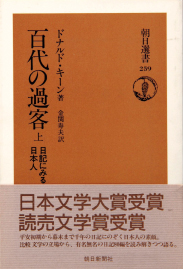
"Hakutai no Kakaku ‒ Nikki ni miru Nihonjin (Travelers of a Hundred Ages:The Japanese as seen through their diaries). 2 vols."
Translated by Hisao Kanaseki Asahi Shimbunsha, 1984
This book, which later appeared in English as Travelers of a Hundred Ages: The Japanese as Revealed Through 1,000 Years of Diaries (Henry Holt and Company, 1989; Columbia University Press, 1999), was the outcome of Keene’s time as a special columnist for the Asahi Shimbun newspaper, a position to which he had been appointed at the informal suggestion of his friend, the renowned novelist Shiba Ryōtarō. Winner of the Yomiuri Literary Award and the Nihon University Grand Prize.
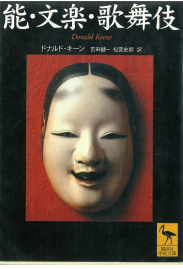
"Noh Bunraku Kabuki (Noh, Bunraku, and Kabuki). "
Translated by Yoshida Ken’ichi and Matsumiya Shirō Kōdansha, 2001
In this book, Keene, who loved the Noh dramatist Zeami and the puppet theatre playwright Chikamatsu Monzaemon, discusses classical Japanese performing arts from the perspective of a literary scholar.
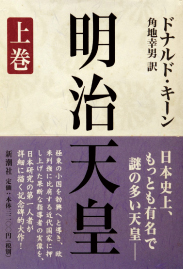
"Meiji Tennō (Emperor Meiji) 2 vols."
Translated by Kakuchi Yukio Shinchōsha, 2001
One of the best sellers among all Donald Keene’s books, this book shines a unique light on the Emperor Meiji. Originally written in English, it was published in 2002 by Columbia University Press as Emperor of Japan: Meiji and His World, 1852-1912.
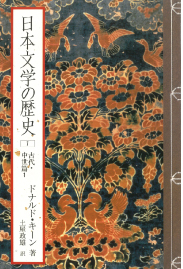
"Nihon bungaku no rekishi (A history of Japanese literature), 18 vols. Translated by Tokuoka Takao, Kikuchi Yukio, Arai Megumi、and Tsuchiya Masao."
Chūō Kōronsha, 1994-1997
It took Keene, working on his own, around 25 years to complete the text of this lavishly illustrated multi-volume history of Japanese literature, which is unrivalled in its thoroughness.
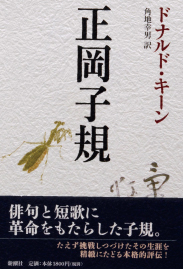
"Masaoka Shiki"
Translated by Kakuchi Yukio Shinchōsha, 2012
A life of the poet, critic, and diarist Masaoka Shiki, whom Keene felt embodied Japan’s early modern period, as opposed to the poet and diarist Ishikawa Takuboku, whom he felt had more in common with our own contemporary spirit.
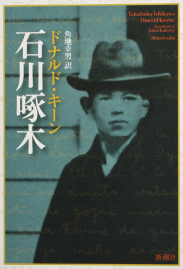
"Ishikawa Takuboku"
Translated by Kakuchi Yukio Shinchōsha, 2016
The culmination of Donald Keene’s research on Ishikawa Takuboku, completed 60 years after he translated Takuboku’s Romaji Diary in Modern Japanese literature : an anthology (Grove Press, 1956).
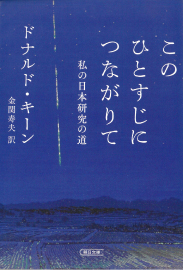
"Kono hitosuji ni tsunagarite (Following This Single Thread)"
Translated by Kanaseki Hisao Asahi Bunko, 2019
This autobiography focuses on the most eventful periods of Donald Keene’s life. In the last few years of his life, he felt a particular affection for it and always kept it near him.
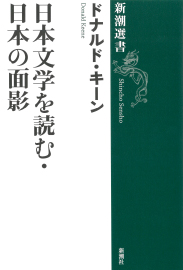
"Nihon bungaku wo yomu, Nihon no omokage (Reading Japanese literature:the faces of Japan)"
Shinchō sensho, 2020
This is the transcript of “Faces of Japan,” a series of talks Keene broadcast on NHK television. It is not included in his collected works, which were published earlier.
Works in English (including translations and anthologies)
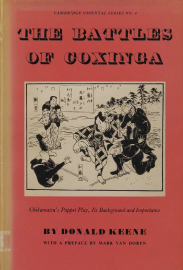
"The Battles of Coxinga: Chikamatsu’s Puppet Play, Its Background and Importance"
London: Taylor’s Foreign Press, 1951
This was Keene’s first book. A translation and study of Chikamatsu Monzaemon’s puppet play The Battles of Coxinga, it grew out of his doctoral dissertation.
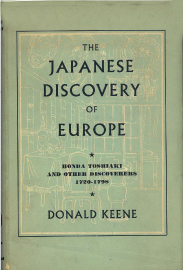
"The Japanese Discovery of Europe: Honda Toshiaki and Other Discoverers, 1720-1798."
London: Routledge and Kegan Paul 1952
This book was an expansion of the thesis Keene wrote for his master’s degree (1947) under the guidance of his mentor Tsunoda Ryūsaku. It was later published in a Revised Edition with new material as The Japanese Discovery of Europe, 1720-1830 (Stanford, Calif.: Stanford University Press, 1969), and translated as 日本人西洋発見 (Nihonjin no seiyō hakken) by Haga Tōru (Chuō Kōronsha, 1973).
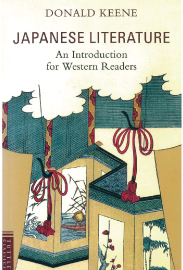
"Japanese Literature; An Introduction for Western Readers"
London: John Murray, 1953
From the lectures on Japanese literature that Keene gave at the University of Cambridge from January to March of 1952. Yoshida Ken’ichi, who translated the book into Japanese (Nihon no Bungaku, Chikuma Shobō, 1963), became a close friend.
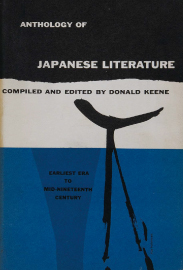
"Anthology of Japanese Literature, from the earliest era to the mid-nineteenth century"
New York: Grove Press, 1955
This is the first volume of the anthology of Japanese literature that Donald Keene compiled and edited. It was dedicated to Arthur Waley, and filled with translations by Keene and many others, all new or else almost unknown until then. The first printing of 2,000 copies sold out in three months and since then the book has never been out of print.
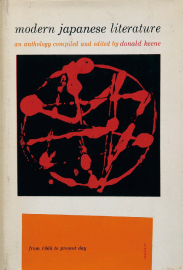
"Modern Japanese Literature: an anthology"
New York: Grove Press, 1956
The second volume of Donald Keene’s anthology of Japanese literature. Even today, over half a century after its first publication, it is still used around the world in classrooms where Japanese literature is taught.
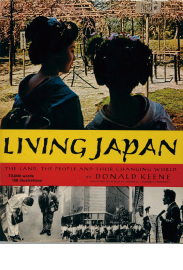
"Living Japan"
Garden City, N.Y. Doubleday, 1959
Keene wrote this book at the suggestion of his close friend Nagai Michio. Its perceptive views of Japan and the Japanese retain their freshness today.
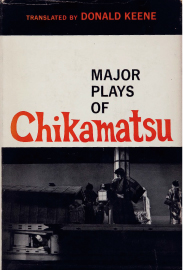
"Major Plays of Chikamatsu"
New York: Columbia University Press, 1961
Translations of 11 jōruri puppet plays by Chikamatsu Monzaemon. Keene’s favorite of all, The Love Suicides at Sonezaki, by a wonderful coincidence was performed for the first time in 250 years while he was studying in Japan.
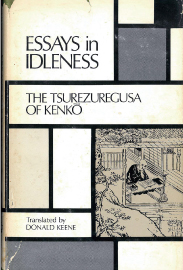
"Essays in Idleness :The Tsurezuregusa of Kenkō"
New York: Columbia University Press, 1967
This is one of two works Keene translated into English feeling “as if I were writing my own book.” The other is Dazai Osamu’s The Setting Sun.
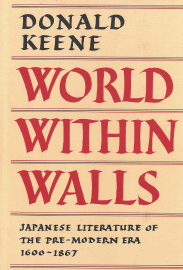
"World within Walls: Japanese literature of the pre-modern era 1600-1867"
New York: Holt, Rinehart and Winston, 1976
This was the first volume of Keene’s monumental four-volume history of Japanese literature to be published. The other volumes, in order of publication, are: Dawn to the West: Japanese Literature of the Modern Era 1 Fiction Holt, Rinehart and Winston, 1984 Dawn to the West: Japanese Literature of the Modern Era 2 Poetry, Drama, Criticism Holt, Rinehart and Winston, 1984 Seeds in the Heart: Japanese literature from earliest times to the late sixteenth century Henry Holt & Co., 1993
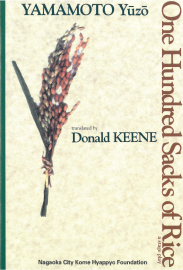
"One Hundred Sacks of Rice : a stage play by Yamamoto Yūzō"
Nagaoka City: Komehyappō Foundation, 1998
For this translation of a celebrated play by the modern playwright Yamamoto Yūzō, Donald Keene was made an Honorary International Citizen of Nagaoka City.
